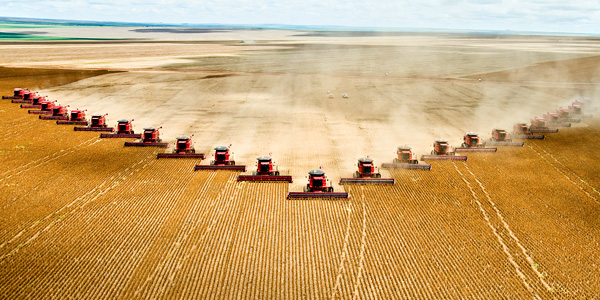What if people can produce an abundance without actually doing much?
Roboeconomics
It’s a new type of economics, that deals with the effects of robotics on the labour force. It goes back to the first weaving machine, but at that time the industrialists invented Keynesianism.

Robotics in agriculture, taken for granted
It should make you think: A bank makes $11,5 billion in profits, but decides it’s time to shed 30,000 workers. Never again can a bank motivate it’s actions with an appeal to job security. But that’s banking.
Foxconn will ’employ’ 1 million ROBOTS in order to drive cost down.
“Foxconn, which has been plagued by a spate of workers’ suicides in its Chinese factories since last year, plans to use the robots for simple assembly line procedures, the statement quoted its chairman Gou as saying.” (source)
Roboeconomics adresses the real need for a redefinition of labour, personal utility and the role of consumption on a world whith cheap high dexterity plastic robots capable of prunig trees and assembling micro electronics. The central question of roboeconomics is:
If we had a machine that made everything we needed,
would we all be jobless and unable to afford anything, or would everything be free?

Grapes pruned and harvested by robots
The world is approaching the point where farming, food processing, making daily used items, clothes, cars, shoes etc. etc. can all be done without any human involvement. Without requiring direct human skills justifying a highly educated workforce. At least not for the majority of tastes. Problem with modern economices is : Then how do people earn money to buy what they need. Roboeconomics has an answer: They don’t. The majority doesn’t. In roboeconomics productivity is unlimited based on renewables and recycling. The question becomes, how much is needed. How do we distribute it. In a Roboeconomy one has two tiers of people: Those in the maintenace and development workforce and those that live a free life. How will both groups be incentivised? how will both groups be maintained? What will the reward structure be that creates stability and allows the two groups to mix.

Roboeconomics is necessary, because spontaneous processes will not arrive in an altruistic and clean world, but more likely tend to ubiquitous depletion, failure and unnecessary competition, like present economics. Of course there is still a lot people can enjoy doing, and maybe that is the model to envision with roboeconomics? Robotic economic / ecological security and human ecological enjoyment. He who manages land best is given more land, so the world becomes a pleasure garden..